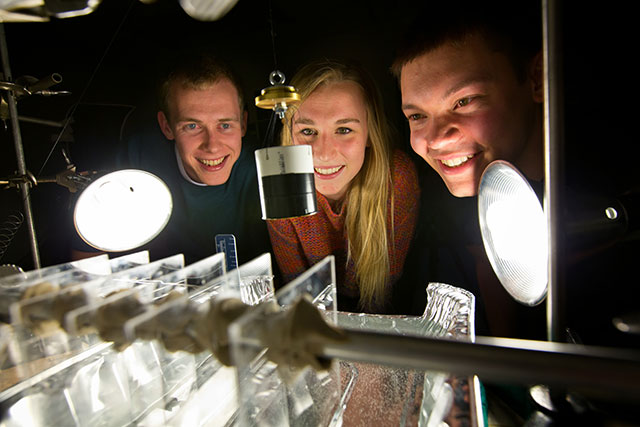Page 26 • (376 results in 0.104 seconds)
-

, and I know I want to teach English as a second language overseas.” Zach Grah ’13, left, and his fellow students ran a simulated company for 20 consecutive quarters, culminating in a competition against 29 other universities in Long Beach, Calif. (Photo by John Struzenberg ’15) Zach Grah ’13 gained the mental toughness and confidence to take risks through his business capstone – a business strategy competition. And that toughness and confidence paid dividends when, later, an opportunity to work for
-
July 7, 2008 Speakers tell PLU audiences to reach outside themselves Rich, diverse and often divergent voices came to PLU over the last year to challenge our outlook on life and our choices. Should one eat meat, or not? What of world hunger, the environment, corporate greed, genocide and women’s rights? What can one person do to address these issues? All speakers stressed that individual choices and actions do matter – even when faced with problems on a global scale. Last fall kicked off with
-

1998 for her volunteer work. As a recipient of the National Eagle Leadership Award in 1999, Long was recognized for her leadership in corporate and social responsibility. Long said working with MESA gave her an opportunity to mentor younger students in the field of math and sciences. ”I enjoyed chemistry. I enjoyed science …My goal was to begin to share the joy I had with them, and hopefully they could arrive at that same level of joy — at least not to fear the challenging topics and be open-minded
-
park and observed free-living chimpanzees. She also spent several days at the institute talking to the staff and learning about the conservation strategy. On one of the last days of her visit, she toured villages in the area, talking to the villagers about how they interact with the conservation project. Along with Webb, five other Lutes – Andy Guinn, Caroline Gonia, Brian Wehmhoefer, Meredith Forrey and Jessica Baumer – studied in Tanzania this fall. Four students from St. Olaf and three from
-
staff about the 2006 campaign to determine what strategies worked and what barriers still exist. Using the survey results, she’ll develop a marketing strategy to inform employees about the campaign and further recycling efforts. Additionally, Buchholz will examine the Environmental Services surplus program and develop an advertising campaign to increase awareness. The surplus program collects unused items from around campus, such as desks, chairs and couches, and sells them at regular garage sales
-

, Seattle’s largest nonprofit developer and operator of affordable housing. “I am under no illusion that my work will solve the affordable housing crisis or homelessness,” Boyd admits. “Every day, I face questions of the ethics, strategy, politics and technical complexity of how to do the most social good with the resources available.” “I am under no illusion that my work will solve the affordable housing crisis or homelessness. Every day, I face questions of the ethics, strategy, politics and technical
-
strategy to combat this trend has been proposed which involves trapping CO2 emissions at their source, and/or drawing CO2 out of the atmosphere, known as carbon capture. An extension of this strategy involves use of the captured CO2 as a reagent to produce methanol (for fuel as well as other purposes). This review examines some of the chemical and technological barriers to making this strategy viable. Three primary barriers are examined: capturing CO2, producing the hydrogen gas necessary to convert
-

than 410 volunteer hours this year. In addition to time spent with her organization, she volunteers time on five other boards and two separate committees. “Service is a big component of my life,” she says. Her current employer walks the talk where volunteering is concerned, allowing employees to volunteer 24 hours for pay annually, rather than sit at a desk. “This company stresses work-life balance,” she says. The usual hectic pace of a corporate lawyer might include 10-hour days plus weekends. “I
-

program at PLU. In addition to serving as one of the company’s primary distillers, he handles marketing duties and communication between partners. He acknowledged that streamlining the latter was a challenge in the beginning. At one point, he says, communication broke down and operations suffered. Bunk remembered his PLU mentor, former professor and corporate executive Carol Ptak, stressed the importance of communication. So, he urged the partners to meet monthly, a move that centered the group. “It
-

authoritative new book that offers the first comprehensive history of American forensics, Forensics in America: A History. Building upon this tradition, PLU Speech & Debate has had a very successful season so far. With a largely new team and a new coach, the team’s success is not so surprising considering the amount of work members put into honing their craft. Tinker, for example, is not only working on old skills; he is working on something new: He and his teammates developed a never-before-seen strategy
Do you have any feedback for us? If so, feel free to use our Feedback Form.


